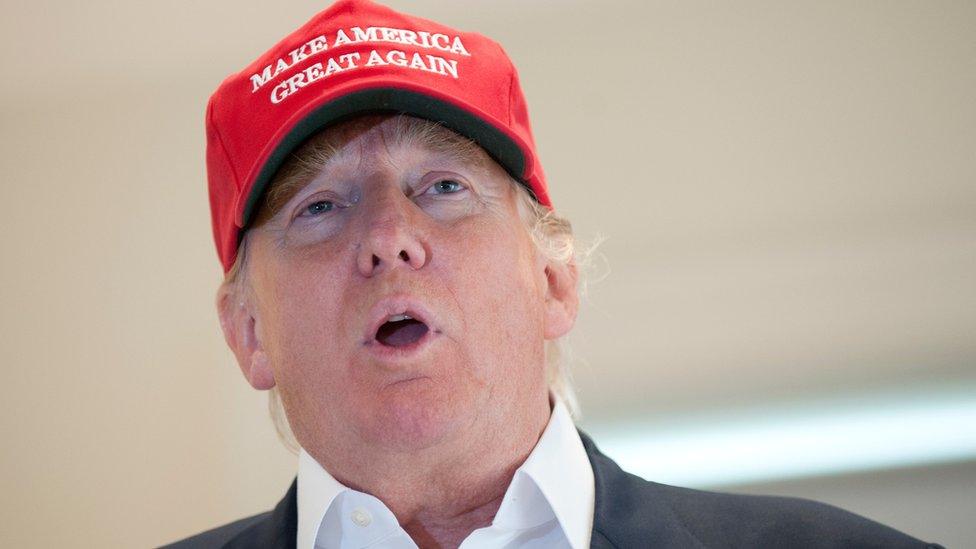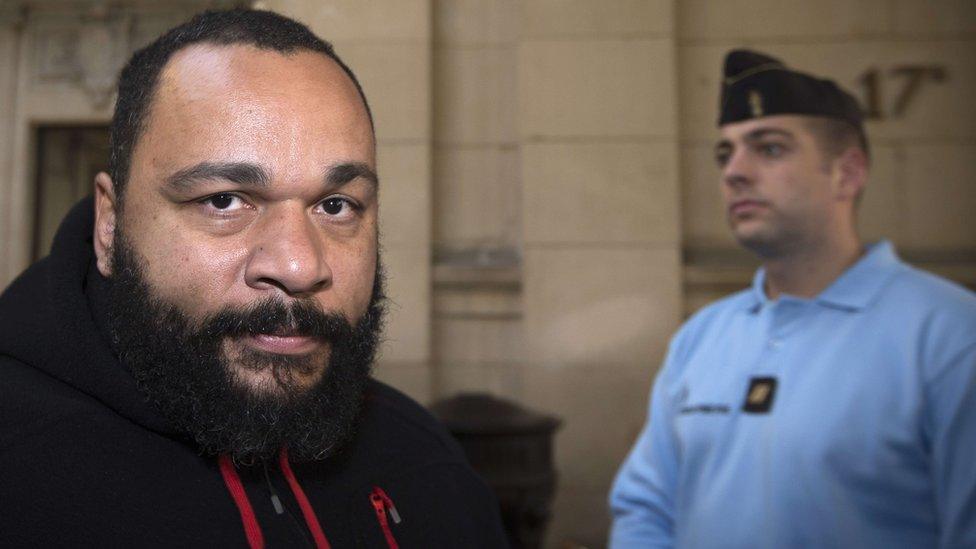Donald Trump: Free speech v hate speech
- Published

Donald Trump has used his right to free speech to forge his way to the front of the race for the Republican presidential nomination - but elsewhere he might have been prosecuted
The First Amendment right to freedom of speech, external under the US constitution permits Donald Trump to make claims and proposals that others might deem unacceptable incitement.
that Arab Americans cheered on the 9/11 attacks, despite a lack of evidence
that a "great, great wall" should be built between the US and Mexico
that many Mexicans in the US are criminals and rapists
that there should be a mass deportation of illegal migrants in the US
most recently. that Muslims should be banned from entering the US solely on grounds of their religion
In other countries, including many European ones where the experience of fascism is still deeply etched, some of these claims might well have fallen foul of hate-speech laws.
In the UK, for example, the Public Order Act 1986, external says:
"A person who uses threatening, abusive or insulting words or behaviour, or displays any written material which is threatening, abusive or insulting, is guilty of an offence if -
(a) he intends thereby to stir up racial hatred, or
(b) having regard to all the circumstances racial hatred is likely to be stirred up thereby."
"Racial hatred" is hatred against a group of persons "defined by reference to colour, race, nationality (including citizenship) or ethnic or national origins".
Additional acts outlaw hatred incited on grounds of religion or sexual orientation.
European convictions
One UK citizen has even launched a petition - currently being considered by the parliament petitions service - seeking to ban Mr Trump from the UK, external for allegedly violating hate-speech laws.
Only two weeks ago the controversial French comedian Dieudonne M'bala M'bala received his latest conviction for incitement to hatred, hate speech and Holocaust denial.

Dieudonne's remarks have landed him in the dock on several occasions
A Belgian court sentenced him to two months in jail in his latest conviction which has earned him fines and jail time in France and Belgium.
The former leader of the far-right National Front in France, Jean-Marie Le Pen, has been convicted of hate speech and anti-Semitism, including Holocaust denial, by both French and German courts.
Some US commentators say there is a "hate speech exception" to the First Amendment, but legal professor Eugene Volokh has argued, external that in fact such exceptions cover only narrow cases of, for instance, using face-to-face "fighting words" likely to start an immediate physical confrontation or inciting imminent illegal conduct.
Hate speech, he says, is not even defined in US law.
Another commentator, Sheldon Nahmod, allows that words, external "can in fact hurt and lead to terrible acts" - but suggests that the US approach seeks not to regulate ideas but to promote a "free market" of ideas - where "citizens are sellers and buyers" and where better ideas eventually win out.
The American Bar points out that one way of dealing with hate speech, external within the US legal framework is to "create laws and policies that discourage bad behaviour but do not punish bad beliefs" - for instance, by prosecuting the physical intimidation or assault, rather than the view that motivated such an action - and increasing the penalty where the victim has been selected due to their race, religion, sexual orientation and so on.
The contrast between the different legal approaches highlights the difficulty of trying to balance the individual's right to voicing their own opinion with protecting community interests and deterring hate crimes.